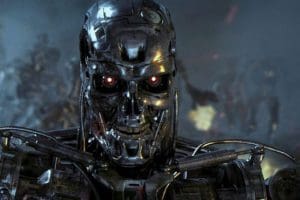Earlier this year, I had a press relations gal reach out to me to see if I wanted to write an article about a supercomputing artificial intelligence (AI) solution from one of her clients. This solution could improve supply chain operations through better forecasting. I was told their solution can “make sense of mountains of data because it can understand, reason and learn.”
We do know that the best chess player in the world is a computer. IBM’s Watson supercomputer even won a Jeopardy tournament in 2011. You may also have heard that renowned physicist Stephen Hawking, and others, has warned super-intelligent machines “could spell the end of the human race.”

Terminator Movie Robot from SkyNet, the AI Solution that Takes over the World
But before AI does take over the world, can supply chain practitioners use AI and cognitive computing technologies to improve supply chain operations? Don’t hold your breath.
When I was in grad school, statistics was my minor. I won’t claim this makes me an expert. But I did learn a few things.
One statistical concept is that of correlation. A correlation is the degree to which various variables or measurements have explanatory or predictive value in some area of study. A correlation of .7 is a very high correlation. A .7 correlation means that just under half of the variables that have explanatory value in some formula have been discovered. To get to a .7 correlation, you might have one variable that has an explanatory value of .35 another which adds another .2, another of .05 and so forth. You might end up with a formula of 10 or so variables, but the last 5 variables add almost nothing in explanatory value.
So we can use AI to search through mountains of data, including new IoT data, to find new variables that add some predictive power to formulas. But in many instances, the new variables that are discovered will probably add relatively little to the accuracy of forecasts.
I would argue that rather than improving the accuracy of forecasts, the primary advantage of Big Data AI solutions is that we will be able to make faster predictions, and in this way be able to more contingency planning surrounding forecasts that will never be totally accurate.
As to AI taking over the world, count me as skeptical. Rodney Brooks, one of the founders of iRobot, was interviewed on this topic by National Public Radio (NPR) this year. He made the point he is truly an expert on AI, it is used in the iRobot solution, and he is not worried. A computer might technically be said to be “learning,” but they don’t comprehend what they have learned in any way that comes close to humans. In short, the intelligence in Artificial Intelligence is very narrow. For an article that explains this in more detail, click HERE.
Mr. Brooks also made the point that for Mr. Hawking to be making predictions about the dangers of AI would be as silly as if he were to make predictions in the field of physics, where Hawking is an expert, but he certainly is not.


















Leave a Reply